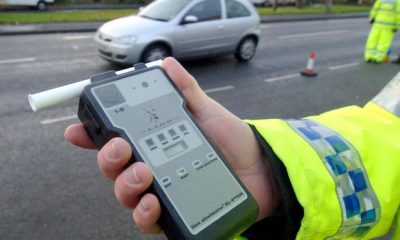Education
Pembrokeshire teacher honoured in prestigious photography exhibition

A remarkable Pembrokeshire educator, David Jones, from Pembrokeshire College, is set to be celebrated in an upcoming photography exhibition, the Gallery of Greats, that recognises the exceptional contributions made by some of the UK’s most inspiring teachers. Organised by The Teaching Awards Trust in conjunction with renowned photographer and part-time teacher Donna Bridgewater, and Pearson, the world’s leading learning company, this unique exhibition marks the 25th anniversary of The Teaching Awards Trust.
The Gallery of Greats exhibition, a testament to the dedication of educators across the nation, will be held at All is Joy Gallery, 75 Dean Street, London, on November 13, for one day only. This exhibition showcases the inspiring journey of ten educators, including David Jones, who have been shortlisted for the prestigious Gold Award at the Pearson National Teaching Awards, the winners of which will be unveiled at a glittering ceremony on November 25, to be featured on BBC’s The One Show from November 20 to 24.
David Jones, an esteemed teacher at Pembrokeshire College, has been acknowledged for his unwavering commitment to supporting vulnerable learners with diverse needs over the past six years. His profound dedication to empowering every learner, celebrating their unique skills, talents, and diversity, has earned him widespread recognition. With a wealth of experience, David passionately devotes 100 hours of his spare time annually to support and mentor young adults, including those in the justice system, helping them shine in various competitions.
Beyond his professional responsibilities, David initiated a groundbreaking independent living competition that enables learners with complex needs to showcase their talents and gain national recognition for their skills and abilities. His efforts have not only empowered students but have also dismantled barriers, opening new pathways for learning.
“It is so rewarding to see my students succeed and believe there are no barriers to their learning,” David expressed, speaking about his passion for teaching. “I am delighted to be able to spread this message by being nominated for a Gold Pearson National Teaching Award and featured in this photography project.”
The Gallery of Greats portraits capture educators in their natural environments, offering a glimpse into their passion and dedication to shaping the lives of young people. In one of the captivating photographs, David is seen with some of his students, engaged in learning day-to-day tasks outside the classroom while having fun, showcasing his innovative teaching methods and fostering a positive learning environment.
Mary Palmer, CEO of the Teaching Awards Trust, emphasised the importance of recognising the transformative influence educators have on their students. “This exhibition visually showcases the impact teachers have on pupils and the innovation and enthusiasm they bring to the classroom day in and day out,” Palmer stated. “We are delighted to work with Donna and All is Joy to bring the Gallery of Greats to life and provide a reminder to people of the important role teachers play in everyday life.”
Education
Language commissioner launches probe into school closure impact on Welsh

THE WELSH Language Commissioner has launched a formal investigation into claims that the proposed closure of a rural Carmarthenshire primary school did not properly assess the impact on the Welsh language.
Campaign group Cymdeithas yr Iaith confirmed this week that the Welsh Language Commissioner will examine whether Carmarthenshire County Council complied with its legal duties when producing a language impact assessment linked to plans to close Ysgol Llansteffan.
The council issued a statutory notice last year proposing to shut the village school at the end of the summer term as part of wider education reorganisation. A final decision had been expected this spring.
However, the investigation now creates fresh uncertainty over the timetable.

Complaint over ‘insufficient assessment’
Cymdeithas yr Iaith says it submitted a formal complaint arguing that the council failed to produce a sufficiently detailed assessment of how the closure could affect Welsh-medium education and the wider Welsh-speaking community.
The group claims the authority selectively used data to support closure rather than examining all available evidence objectively.
Two key concerns were raised.
Firstly, campaigners argue there may not be enough places in neighbouring Welsh-medium schools to accommodate pupils from Llansteffan and nearby housing developments, potentially forcing some families into English-medium provision.
Secondly, they say the assessment did not meaningfully consider the school’s role as a community hub or explore ways the site could generate income and support local Welsh-language activities.
On behalf of local members, Ffred Ffransis said: “There will not be places for all the Llansteffan children, nor for the children of the new housing estates, in other Welsh-medium schools in the area.
“The most cost-effective way of providing sufficient places locally in Welsh-medium education is by keeping open Ysgol Llansteffan and making better use of the buildings, including environmental education and community use.”
Formal investigation
In a letter to the group, the commissioner confirmed an investigation will be held under Section 71 of the Welsh Language Measure to determine whether the council complied with Welsh language standards.
The probe could take up to three months.
Campaigners believe this may delay implementation of the closure and could require the council to revisit its assessment and potentially carry out a fresh statutory consultation.
Ffransis said: “Even if the council now decided to make a full and meaningful assessment, there would likely have to be a new consultation. The original decision may have been taken on a faulty basis.”
He added that similar concerns had been raised about language impact assessments connected to other proposed school closures in the county.
Council position
The council has previously said that school reorganisation proposals are driven by falling pupil numbers, financial pressures and the need to ensure sustainable, high-quality education.
Authorities across Wales have faced difficult decisions in recent years as rural rolls decline and building maintenance costs rise.
It is expected the council will respond formally to the commissioner’s investigation in due course.
What happens next
If the commissioner finds that language standards were not properly followed, enforcement steps could be taken and the process delayed or revisited.
For families in Llansteffan, the outcome may determine whether their local Welsh-medium school remains open beyond the summer term.
The Herald has contacted Carmarthenshire County Council for comment.
Further updates will follow as the investigation progresses.
Community
Cilgerran Church in Wales school petition to be heard

A PETITION opposing proposed changes for a north Pembrokeshire school is to be heard by councillors later this week.
At last May’s meeting, Pembrokeshire County Council considered a report of the School Modernisation Working Group which outlined the findings of a review of education provision in the Preseli area.
A later July meeting backed a general consultation to discontinue Cilgerran Church in Wales Voluntary Controlled School, and to establish it as a 3-11 community school.
“In particular, the review considered the extent of surplus school places in the area, set against a significant decline in the pupil population,” the council in its consultation has said.
The consultation closed on January 30.
Hundreds have opposed the proposed changes, with a petition, on the council’s own website opposing the changes recently closing after gaining 391 signatures.
Any petition of more than 100 signatures triggers a debate at one of the council’s scrutiny committees, in the case of Cilgerran that debate taking place at Pembrokeshire County Council’s February 5 schools and learning overview and scrutiny committee.
The Cilgerran e-petition, created by Louise Williams, raised concerns including the school could become part of a federation, a loss of permanent head teacher on site, a shared head teacher would have to oversee several schools, loss of funding control and the ability to maintain the school’s current healthy and stable funding, and a loss of commitment to the church, in turn could impact on the school’s and pupils values, beliefs and cultural beliefs.
It said: “Ysgol Cilgerran VC school has strong links with the Church community in Cilgerran and we believe this will have a negative impact on the children who attend the school, the community of Cilgerran and the links between the two.
“We are proud of our school ethos and values which are strengthened by our links with the church. The school has close and strong relationships with our Church in Wales federation governors one of which is also our safeguarding governor.
“Our Church Federation governors work closely with the school and are regular visitors to the school and the children. They provide vital support and guidance to the school and have a positive impact on the Children’s education. We believe these links will be weakened by this proposal to remove our VC status and we believe this is an un-necessary action.”
The proposals for Cilgerran are part of a wide range of potential education changes in the county.
Two petitions, opposing the potential closures of Manorbier and Ysgol Clydau schools, were recently heard at full council and a further petition opposing the potential closure of Stepaside School has recently been launched, which has generated enough support to be heard at a future council meeting.
Education
Industry insight helps marine cadets chart career course

Shipping professional visits Pembrokeshire College to showcase real-world opportunities on the Milford Haven Waterway
STUDENTS training for careers at sea were given a first-hand look at life in the maritime industry after a leading shipping professional visited Pembrokeshire College to share his experience of operations on the Milford Haven Waterway.
Toby Forester, from Williams Shipping, met with the College’s Enhanced Marine Engineering Pre-Cadets to explain how commercial shipping, marine services and logistics work together to keep one of the UK’s busiest energy ports moving.

Learners heard about the wide range of activity taking place daily on the estuary, including vessel movements, specialist support craft, safety management and the coordination required to operate safely and efficiently in a working port environment.
Staff said the session gave students valuable real-world context, helping them understand how the engineering skills they develop in workshops and classrooms directly translate into careers within the maritime and energy sectors.
The visit forms part of the College’s wider effort to strengthen links between education and industry, ensuring young people are exposed to employers and career pathways while still in training.
College representatives said experiences like this help build confidence and ambition among learners considering technical roles at sea or ashore.
They thanked Williams Shipping and Mr Forester for supporting the next generation of marine engineers and helping inspire future talent in Pembrokeshire’s coastal economy.
Photo caption: Marine engineering pre-cadets at Pembrokeshire College welcomed an industry talk from Williams Shipping about operations on the Milford Haven Waterway (Pic: Supplied).
-

 Health6 days ago
Health6 days agoConsultation reveals lack of public trust in health board
-

 News1 day ago
News1 day agoPrincess of Wales visits historic Pembrokeshire woollen mill
-

 Crime5 days ago
Crime5 days agoPembroke man accused of child sex offences sent to Swansea Crown Court
-

 Community6 days ago
Community6 days agoCampaign to ‘save’ River Cleddau hits over 2,200 signatures
-

 Health3 days ago
Health3 days agoDoctor struck off after sexual misconduct findings at Withybush Hospital
-

 News7 days ago
News7 days agoWelsh Conservatives push for reversal of 20mph limit and major road spending
-

 Health7 days ago
Health7 days agoAmbulance called after ‘drop of mouthwash’ swallowed as 999 abuse highlighted
-

 Crime5 days ago
Crime5 days agoManhunt intensifies after woman seriously injured in Carmarthen park stabbing




































